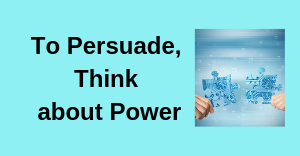Persuasion is a crucial part of our everyday communication, whether at work or socially. And have you ever considered that to be more persuasive, you need to think about power dynamics?
How does feeling powerful play out, both for speaker and audience?

To uncover more about this, let’s look at persuasion and power and how these interact with another key factor in our communication style: warmth and competence.
Psychologists consider warmth and competence to be universal principles. In social perception terms, they’re key ways we evaluate people, particularly when we first meet them.
So how does considering power alongside warmth and competence, make you more persuasive?
The research
Some interesting research came out about this in 2016 from the Kellogg School of management in the U.S.
Firstly, the warmth and competence factor:
Competence: are you going to focus on expertise, efficiency, reliability?
OR
Warmth: are you better to highlight approachability, trustworthiness or sincerity?
The researchers at the Kellogg School suggest that the answer can sometimes depend on how powerful both you and your audience are feeling.
For more powerful audiences, researchers found they were more convinced by pitches focusing on competence and skilfulness. For audiences feeling less powerful – or powerless – they were more persuaded by the speaker emphasising warmth and sincerity.
(In this research, the psychologists used priming techniques to temporarily affect how powerful participants felt in the moment.)
After four experiments, the researchers saw two clear trends:
- How powerful the speaker felt influenced the type of the arguments they used. High-power communicators focused on more competence related persuasive arguments; low-power speakers on more warmth-related persuasion techniques
- High-power audiences were more convinced by messages from high power speakers. And low-power audiences were more convinced by messages from low-power communicators
Why would this happen?
The researchers suggest that when people feel powerful, they care more about competence, and see that as important. And this applies to both speaker and audience: a high-power speaker will talk more about competence, and high-power audience be more receptive to that message.
And of course the reverse: warmth matters more to low-power speakers and audiences.
Alignment vs mismatch
This works just fine if both speaker and audience are aligned in high or low power. But when they’re not, the message won’t be a good fit, and will be less persuasive. The audience will disconnect.
Be aware of the difference between positional and personal power
Be aware too that there’s a difference between positional power and personal power. Positional – e.g. level of management – is stable (at least as you’re presenting in the moment!), but personal power, which is about how you feel about yourself, can fluctuate. If you meet an audience who as a group, usually feel powerful, but something’s happened to knock them on that particular day, you’ll probably want to change your message ‘warmth and competence’ focus.


Comment (1)
[…] Or another, on how persuasion and power interact. […]